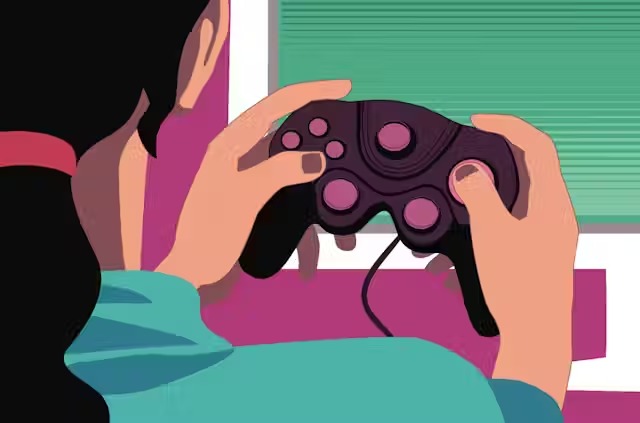As the gaming industry has grown and evolved, so has its capacity to create powerful social connections. What started as simple games with pixelated graphics has blossomed into a global phenomenon where players not only share in exciting adventures but also form deep, lasting friendships. Gaming communities have transcended borders, backgrounds, and cultures, uniting players with a common passion. These virtual spaces have become vital in fostering human connection, enabling people to bond over shared experiences in the digital world.
In this article, we’ll explore how gaming communities forge strong bonds, the role of teamwork and communication in creating these relationships, and the many ways in which virtual friendships can have a lasting impact in the real world.
The Evolution of Gaming: From Solo Play to Collaborative Adventures
The journey of gaming began with simple single-player experiences. In the early days, titles like Pong and Super Mario Bros. captivated gamers, but they were largely solo activities. Players enjoyed gaming for the challenge and the thrill of completing levels, but opportunities for social interaction were limited. This all began to change with the rise of multiplayer games and the advent of online connectivity.
As technology advanced, so did the ability for gamers to connect with others. Local multiplayer games, where friends gathered in the same room to play together, were the first step toward creating a more social experience. But it was the introduction of online gaming that truly revolutionized the landscape. Suddenly, players could compete and collaborate with others from across the globe, laying the foundation for the vibrant, interconnected gaming communities we see today.
Now, gaming is rarely a solitary pursuit. Games like Fortnite, Call of Duty, and Minecraft are centered around multiplayer experiences, encouraging collaboration, communication, and teamwork. In these virtual spaces, bonds are formed as players work together to solve problems, complete missions, and achieve goals. The rise of these communal experiences has transformed gaming into a powerful tool for building friendships.
Teamwork and Cooperation: The Core of Gaming Friendships
One of the primary ways that gaming communities bring players together is through the necessity of teamwork. Many modern games are designed to require collaboration, with players depending on each other’s unique skills and abilities to succeed. Whether it’s working together in a raid in World of Warcraft or coordinating a tactical strike in Rainbow Six Siege, players quickly learn that success is dependent on their ability to communicate and cooperate with their team.
This reliance on teamwork creates an environment where trust is built. Players need to depend on one another, and through repeated collaboration, they develop strong bonds. These experiences aren’t just about winning or achieving in-game objectives; they are about the journey shared with fellow players. The time spent strategizing, communicating, and celebrating victories (or commiserating after defeats) becomes the foundation of lasting friendships.
The importance of teamwork is further amplified in eSports and competitive gaming. Teams train together for hours, honing their skills and perfecting strategies. The bonds that form through this intense collaboration often extend beyond the game itself, leading to strong personal connections that endure long after the competition ends.
Communication and Connection: The Role of Chat and Voice in Building Friendships
In gaming, communication is key. Whether it’s through in-game text chat, voice communication, or external platforms like Discord and TeamSpeak, players are constantly interacting with one another. This frequent and open communication is one of the cornerstones of building friendships within gaming communities.
For many, online gaming provides a space to freely express themselves. The anonymity of the internet allows players to shed any preconceived notions or societal pressures they may face in their day-to-day lives. 카지노커뮤니티 Instead, they can focus on the common interest they share with others: a love for gaming. Over time, as players continue to interact, discuss strategies, and engage in banter, they begin to form connections based on trust, shared experiences, and mutual respect.
Voice chat, in particular, plays a significant role in fostering closer relationships. Hearing someone’s voice adds a layer of authenticity to interactions and helps to humanize the person behind the avatar. Friendships formed in this way often feel more personal and real, leading to deeper emotional connections.
Shared Experiences: How Gaming Brings People Together
One of the most powerful aspects of gaming is the ability to share experiences with others. Whether it’s surviving an intense battle in PUBG, building a massive structure in Minecraft, or solving complex puzzles in Portal 2, the act of sharing these moments creates a sense of camaraderie among players. These shared experiences are the foundation upon which strong friendships are built.
For many gamers, the memories made during these moments are significant and long-lasting. Overcoming a difficult challenge or achieving a hard-fought victory becomes a shared story that players carry with them. It’s this shared history that turns casual acquaintances into close friends.
Additionally, gaming communities often extend beyond the games themselves. Players join forums, social media groups, and platforms like Reddit to continue discussions, share memes, or arrange future gaming sessions. This ongoing engagement reinforces the bonds formed during gameplay, ensuring that these friendships continue to grow over time.
Inclusivity in Gaming Communities: A Space for Everyone
One of the key strengths of gaming communities is their inclusivity. These communities bring together players from diverse backgrounds, ages, and cultures, united by their shared love of gaming. Whether you’re a casual player or a hardcore gamer, there’s a place for you in the world of online gaming.
Unlike many social environments where people are judged based on appearance, social status, or background, gaming communities focus on skill, teamwork, and the ability to contribute to the group. This creates an environment where individuals can connect on a deeper level, free from the biases that may exist in other areas of life. Players are judged by their actions and character, not by external factors, making gaming communities a space where meaningful relationships can flourish.
Inclusivity in gaming has also seen significant growth with the rise of spaces that promote diversity, such as communities for women gamers, LGBTQ+ gamers, and players with disabilities. These inclusive groups provide a safe environment for individuals to engage with others who share their experiences, creating a sense of belonging and mutual support. As a result, gaming communities have become more diverse, welcoming, and understanding, further strengthening the bonds between players.
Virtual Friendships Becoming Real-Life Bonds
The friendships forged in gaming communities don’t just stay online. In many cases, these virtual connections blossom into real-life friendships. Players often meet up in person at gaming conventions, tournaments, or even personal gatherings. Events like BlizzCon, E3, and PAX offer opportunities for gamers to connect in real life, deepening the bonds that started in-game.
For many gamers, meeting their online friends in person solidifies the connection they’ve already built. What started as a friendship formed through pixels and gameplay turns into a real-world bond, with players continuing to support and interact with one another long after the gaming session ends. Many report that their closest friendships began online, with shared gaming experiences providing the foundation for deeper, lasting connections.
Emotional Support: How Gaming Communities Become Lifelines
Beyond gameplay, gaming communities often serve as emotional support networks for their members. In times of stress, anxiety, or personal hardship, many players turn to their online friends for comfort and advice. The bonds formed through shared gaming experiences often translate into real-life care and concern.
Players who may struggle with making connections in traditional social environments find solace in gaming communities, where they can be themselves without fear of judgment. The friendships they form become a vital source of support, offering encouragement and understanding when needed most. This emotional connection often strengthens the bonds between players, creating friendships that go beyond the virtual world.
Conclusion: From Pixels to Friendships – The Power of Gaming Communities
Gaming communities have come a long way from the days of pixelated graphics and solo play. Today, they are powerful hubs of connection, bringing people together from all walks of life. Through teamwork, communication, shared experiences, and inclusivity, gaming communities have the unique ability to forge strong, lasting friendships that extend far beyond the virtual world.
As technology continues to evolve and gaming becomes even more immersive, the bonds formed within these communities will only grow stronger. From pixels to friendships, the connections built through gaming will remain a testament to the power of shared passion and the human need for connection in an increasingly digital age.








